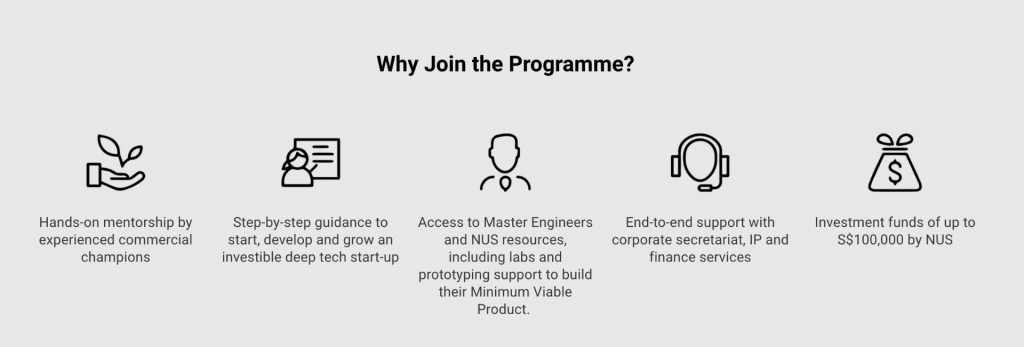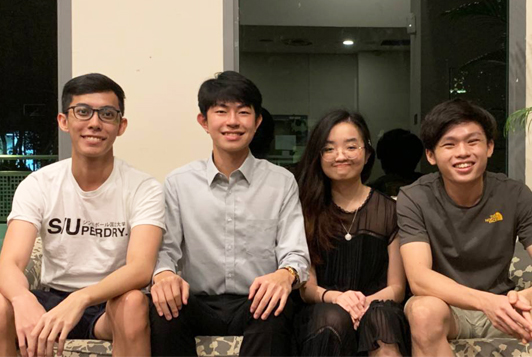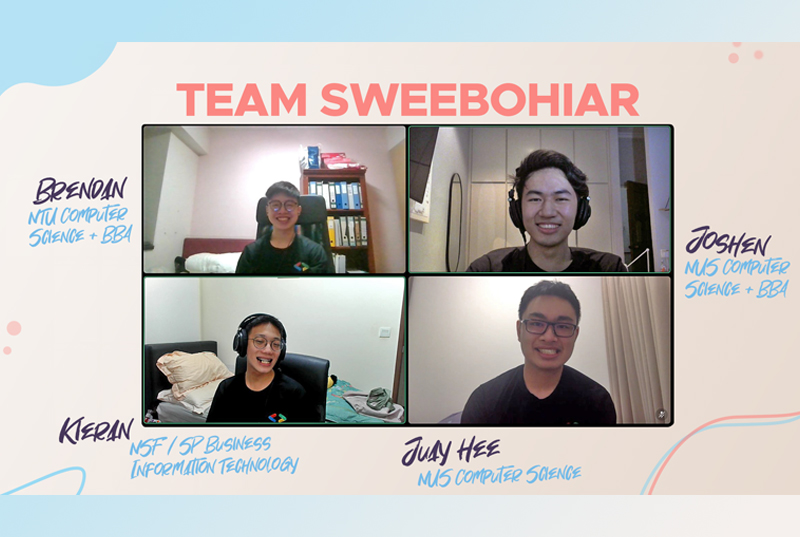What are some of the ‘taboo topics’ you were too afraid to ask or respond? If someone were to ask you: “Would you marry someone from a different race?”, what would your honest answer be?
The question on interracial marriages is one of the many tough questions users can respond to on a new mobile application prototype, “The Social Census”. The prototype was conceptualised and developed by a NUS Computer Science team comprising year two students – Ek Chin Hui, Goh Wen Hao, Le Hue Man and Maxx Chan Yuhang.
The Social Census was their submission to the annual Hackathon organised by the Developer Student Club at NUS, an incubating club under the School of Computing, in collaboration with Conjunct Consulting, in response to the challenge statement posted by NUS Office of Student Affairs.
OSA has asked: “How can technology assist youths to understand and appreciate diversity and differences; with the newfound understanding and appreciation, how can youth participate in creating a more inclusive space?”
The team drew much inspiration from their residential live-in experiences at Tembusu College where diverse communities are acknowledged. The residential college setting allows an inclusive culture and residents are free to express a variety of ideas in the safe space. They wanted to re-create a similar safe space for others, in hopes of promoting a more inclusive society in Singapore.
The Social Census attempts to illuminate the differences in youths’ views and experiences through a “simple, fun-to-use question-and-answer platform that provokes thought and discussion about diversity issues in Singapore.”

Their journey was not without challenges. One of which was time, for they were given only two weeks to prepare during the mid-terms period. The other was coming up with a solution they believed in.
Maxx elaborated: “I think we got the approach wrong in our first week, looking at what was ‘cool’, and what we wanted to code, instead of analysing the problem first. On hindsight, we did things backwards. In spite of the time crunch, we had to pull the brakes. We decided to take a good look at the problem statement afresh and rethink our entire solution.”
Their hard work was affirmed by the judging panel and they won the second prize at the hackathon. Shawn Low, co-founder of a few non-profits and one of the three esteemed judges, shared his view: “The Social Census provides a real-time window into shifting social attitudes and has real potential to be an effective catalyst for positive change. I believe the key to its success will lie in the team’s ability to drive user engagement and to effectively facilitate productive dialogues offline. I wish the team the best of luck in its implementation and thank them for their efforts. “
Jeremy Au, an experienced venture capitalist who also sat on the judging panel, described the proposal as a “well-designed approach to surface and discuss differences in opinion”.
Participating in the hackathon impacted the team in many ways. Chin Hui recalls: “While researching on different areas of diversity and differences in Singapore, I learnt a lot more about groups that are often overlooked in society and the challenges they face. For example, I came across a collection of short stories by Singaporean Seniors called "Senior's Journey: Past, Present and Future" collated by the National Council of Social Service (NCSS), this made me more aware of the differences in lifestyle back then. Through understanding the vastly different lives that the elderly have gone through in their youth, I am now more appreciative of the contributions they have made and more curious about their lives. This is the spirit that we hope our application spreads: a desire to find out more about others who are different from us. Seminars hosted by Conjunct Consulting have also shed light that good intentions alone are not enough and having a plan that is sustainable and targets the stakeholders effectively is equally important.”
The team had found a new calling, and that is to continue to look for innovative ways to utilise technology for social causes.
| About Hack for Good |
| Running in its second year, Hack for Good is an annual Hackathon organised by the Developer Student Club at NUS. The month-long event attracted 30 submissions to five challenge statements provided by four non-profit organisations. |
Share:
Contributor
Office of Student Affairs, Community Engagement



